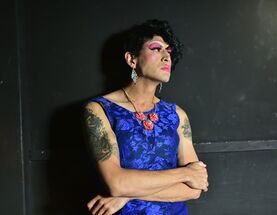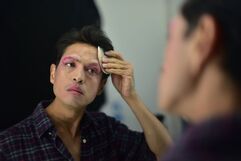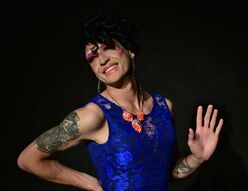The Drag Race debate
Let's talk about Drag Race...

Drag Race holds enormous commercial appeal, it's brought drag into the mainstream and has made stars out of many of the people who've appeared on it. But is it a force for good, or has it harmed more than it has helped?
Over the years, Drag Race has helped dozens of performers to launch lucrative international careers. In May 2019, season six winner Bianca Del Rio became the first drag queen to headline London's 12,500-capacity Wembley Arena and Drag Race alumni play decent-sized venues all over the world in package tours. But for most performers, drag is not something they can earn a living from and the costs of the costumes and make-up can exceed the money the earn from weekend appearances in small venues that are a world away from Wembley.
When the UK version of the show was announced, alongside the speculation of which drag queens would be part of the first line up, there were several people immediately distancing themselves from the show and expressing concern about what it might do to the UK drag scene. For some the damage had already been done, with the traditional image of the drag artist as a brash, down to earth, exaggerated, often vulgar, stereotype being replaced by something more glamorous, and acrobatic lip-syncing routines taking over from badly sung cover versions.
Over the years, Drag Race has helped dozens of performers to launch lucrative international careers. In May 2019, season six winner Bianca Del Rio became the first drag queen to headline London's 12,500-capacity Wembley Arena and Drag Race alumni play decent-sized venues all over the world in package tours. But for most performers, drag is not something they can earn a living from and the costs of the costumes and make-up can exceed the money the earn from weekend appearances in small venues that are a world away from Wembley.
When the UK version of the show was announced, alongside the speculation of which drag queens would be part of the first line up, there were several people immediately distancing themselves from the show and expressing concern about what it might do to the UK drag scene. For some the damage had already been done, with the traditional image of the drag artist as a brash, down to earth, exaggerated, often vulgar, stereotype being replaced by something more glamorous, and acrobatic lip-syncing routines taking over from badly sung cover versions.

So is Drag Race selling out a hard fought history for commercial appeal, redefining drag and strait-jacketing it at the same time? Is it doing to UK drag what the WWF did to wrestling? Are we saying goodbye to the drag equivalent of Big Daddy and Giant Haystacks and should we mourn their passing? If this collection of quotes is anything to go by, the jury is out...
|
The case for...
“Drag Race remains one of the few places we can see our queer experiences reflected on a platform of this scale. The show, as wacky as it is, does provide queer people with sincere moments of joy, a rare thing in the political environment we find ourselves in where queer people are regularly targeted." "In this heist of American culture, outsiders can suddenly claim their pop culture-beating heart and the real financial rewards that come with it. It is the ultimate triumph for the art of drag: the creation of an illusion that is satire and yet shockingly real. |
The case against...
"Many people now look to it as the default of drag or a staple of gayness, when it's basically a drag version of The X Factor. It does as much for the LGBTQ community as The X Factor does for the music industry as it has such a particular stance on drag and gender." "A reality TV-show franchise that has “Barbie”-fied the art of drag: taking a staple of underground queer nightlife and turning it into a basic cable commodity perfectly positioned for the all-important suburban white girl market." |

Summing up
"Drag is, ultimately, about knowing who you are, what society thinks of that and making humor, beauty and art from the mess of it. It’s a radical form of self-naming and self-reclaiming that has been brought to the masses in the surprising form of reality TV. But if drag is going to give its fullest gift to the world, it has to grow bigger than the show that elevated it to basic cable."
"Drag is, ultimately, about knowing who you are, what society thinks of that and making humor, beauty and art from the mess of it. It’s a radical form of self-naming and self-reclaiming that has been brought to the masses in the surprising form of reality TV. But if drag is going to give its fullest gift to the world, it has to grow bigger than the show that elevated it to basic cable."
